
Inside WhatsApp groups where faceless fraudsters lure Nigerians with double returns schemes
Victoria Bamgboye, a penultimate student at the University of Ilorin, has always longed for a financial breakthrough and a job that would free her from relying on her mother’s support, but she faced a concrete wall everywhere she turned — no one wanted to employ a university student.
In June, her roommate introduced her to a scheme that promised to double her money. Bamgboye had her doubts at first, but after seeing receipts confirming that the scheme had credited some people, her doubts vanished.
She was hooked instantly and was added to a group on WhatsApp after signifying interest. The admins of the group promised Bamgboye and other members they would receive double their investments. All they needed to do was invest and complete daily tasks, such as watching video advertisements online for five minutes.
Days after she joined, members of the group who attempted to withdraw their returns began complaining that they received nothing.
“People placed withdrawals of N200,000. Some N500,000, but the money did not drop. I asked questions and I was told that such had never happened before. People kept on waiting, and after that day, they were asked to pay N4,400 for security purposes.
“That was for people on level one. People on level two were required to pay N19,500. People paid and still did not get their money. Then we were asked to pay for something else again,” said Bamgboye.
It was that moment the university student realised she had been lured into a scam. She left the group with nothing but her dreams of financial freedom.
What do WhatsApp and scams have in common?
The platform that defrauded Bamgboye had the same features as Ponzi schemes and scams, according to the Securities Exchange Commission. These scams are common across the country. As soon as a Ponzi scheme or scam platform crashes, another surfaces, pulling many Nigerians into a web of fake promises, exploitation, and extortion.
Nigerians lost 12 billion naira to Mavrodi Mondial Moneybox (MMM), a ponzi scheme that shook the country in. Almost a decade later, another major Ponzi scheme, CBEX, sprang up. Between 2016 and 2023, Nigerians lost about N1.7 trillion to Ponzi schemes. Aside from these popular ones, there are still some lesser-known scams that exploit Nigerians, like the one Bamgboye fell victim to.
The masterminds behind these scams seek to recruit more victims. This is where WhatsApp, the most common digital messaging platform in Nigeria, comes in.
As of April 2024, Nigeria had about 51 million active WhatsApp users, which represented approximately 3% of the global WhatsApp user base, making Nigeria the 10th largest WhatsApp country by user count.
Scammers pitch their tents on WhatsApp, targeting vulnerable Nigerians seeking financial freedom or quick wealth. The masterminds share the links of the group to other groups or ask members of the group to refer more potential victims, and in weeks, hundreds of members flood the groups, each one hoping to get their money doubled like the masterminds promised.
Sometimes, when the links of these scam groups are sent to other groups, some members instantly recognise them as scams and call the attention of the group admin to it. The admin then deletes the message and removes the member from the group to save others from falling victim.

In other cases, nothing happens, and vulnerable Nigerians who are the main target of the scams join and part with their money.
On these groups, the masterminds who are also the group admins share false testimonies, fake credit alerts, and words of motivation to lure Nigerians into believing them. The groups act as recruitment platforms for more potential victims and a platform where they disseminate information about the scam.
Posing as a potential investor, The Guardian’s correspondent joined four WhatsApp scam groups and studied how they operated over a three-week period.
Scam group posing as PiggyVest
In October 2024, one WhatsApp user shared the link to a scam group called the Piggyvest investment platform to a group for corps members. It was instantly flagged by other members of the group, and the admin of the group deleted the link.
“I want to introduce you to this platform called Piggyvest Investment. It is really paying. It is called Piggyvest investment platform. I invested in it and I have just been credited. I invested N20,000 and was credited with N40,000,” the user wrote.
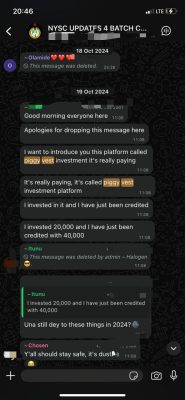
The Guardian’s correspondent joined the group on August 12. The group, which has been existing since November 13, 2022, fronts as Piggyvest, a savings and investment platform, and uses its logo as its display picture.
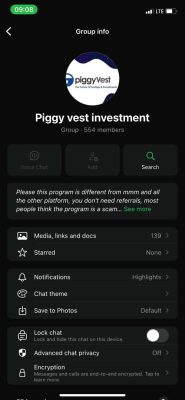
When contacted for comments, Piggyvest dissociated itself from the scam group.
“We can confirm that PiggyVest is not affiliated in any way with the WhatsApp group you have described. PiggyVest does not operate or conduct any official transactions via WhatsApp or similar informal channels,” Titilope, an account manager at PiggyVest, wrote in an email.
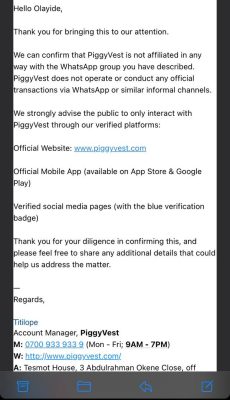
The group has four admins. Among these four, three are named Grace, while one is named Godwin. As soon as new members join, one of the admins, Grace, sends a direct message to them, telling them about the platform and asking if they are interested.
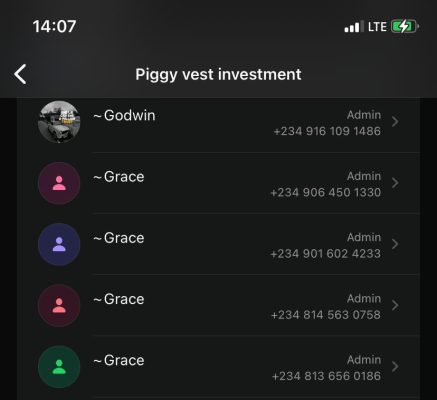
Grace, then, harasses new members with a barrage of calls, asking when they will invest. During one of such calls with The Guardian’s correspondent, the voice of a child was heard in the background.
Every morning, she shares videos of people testifying to the platform, fake credit alerts, words of motivation and assures members that it is a legitimate platform, not another MMM or ponzi scheme. Some of the videos she shared had been used by similar scams in the past..
Between August 12 and the time of publication, no fewer than 40 new members had joined the group. The admin, Grace, would remove members occasionally.
In chats with some members of the group, The Guardian’s correspondent learnt that not all the members of the group joined of their own volition, but were added by other people.
WhatsApp scam group admins claiming to be pastors
Two of the four WhatsApp scam groups The Guardian’s correspondent joined had the same name, Boldgains Investment. One was created on February 28, 2021, while the other has been in existence since April 2, 2023.
The admins of both groups claimed to be pastors. One of the groups also claimed popular Nollywood actress Patience Ozokwor endorses it.
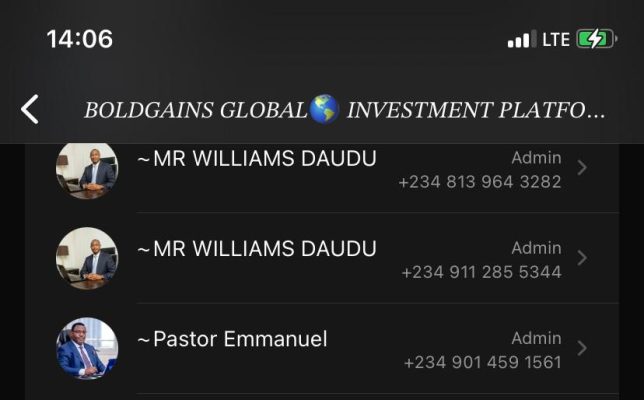
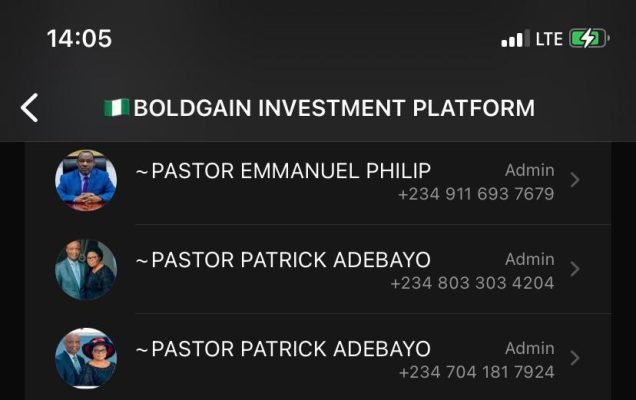
In 2021, Ozokwor advised Nigerians to beware of scammers using her name to defraud Nigerians.
Many Nigerians have called out Boldgains in the past for scamming them of their hard-earned money. In 2022, a Lagos-based retiree lost N132,000 to the scam after being promised double her money.
She initially invested N100,000, but was asked to pay N10,650 into three separate wallets to recover her money. She obliged but never received anything in return.
One member who invested N100,000 in the scheme got nothing in return. He sent a message on the group expressing his doubt about the scheme, but the admins removed him from the group a few minutes after he sent the message.

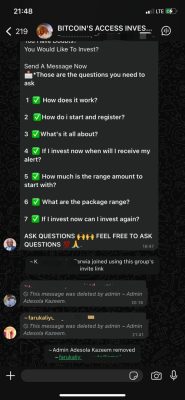
“I am doubting it because I have invested for more than two weeks, but nothing yet,” he wrote.
In a conversation with The Guardian’s correspondent, the victim revealed he invested N100,000 and was asked to pay N15,000 to withdraw his returns.
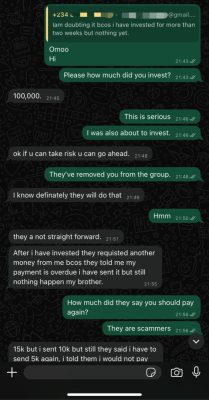
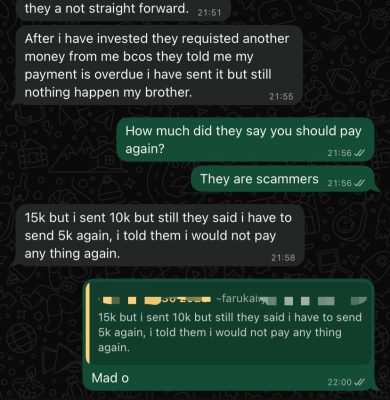
“They are not straightforward. After I had invested, they requested another money from me. They told me my payment is overdue. I have sent it, but nothing happened,” said the victim.
Faceless scammers, stolen identities
A reverse image search conducted by The Guardian on the administrators of the scam groups revealed their use of stolen identities.
Through Duplichecker, an image verification tool, the picture used by “Pastor Patrick Adebayo” of Boldgain Investment Platform was traced to Rev. Dr. Chidi Okoroafor, Founding International President of the Intercessors’ Prayer Camp International.
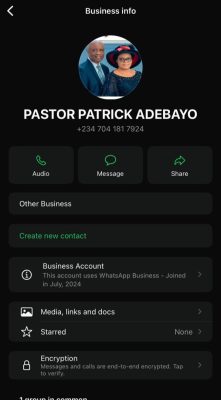

The man posing as “Pastor Emmanuel Phillip” was using a photo of Gatete Claver, Rwanda’s former Minister of Infrastructure.
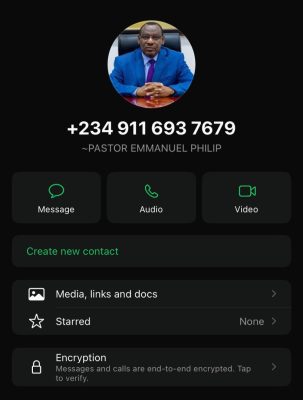
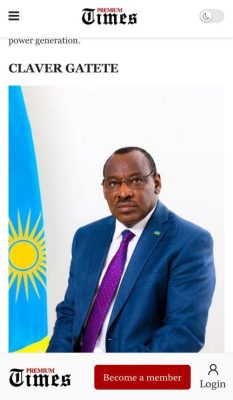
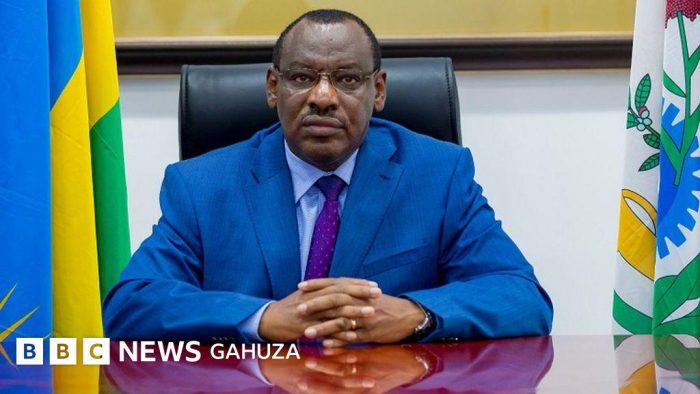
Another administrator, “Mr. Williams Daudu,” presented himself with an old image of Zamfara State Governor, Dauda Lawal, when he was a banking executive.

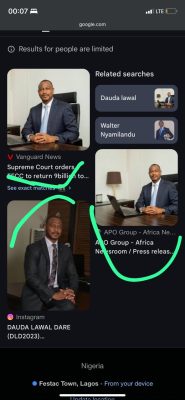
Another administrator, also calling himself “Pastor Emmanuel,” used the image of Keystone Bank alongside its former Group Managing Director/CEO, Dr. Obeahon Ohiwerei.
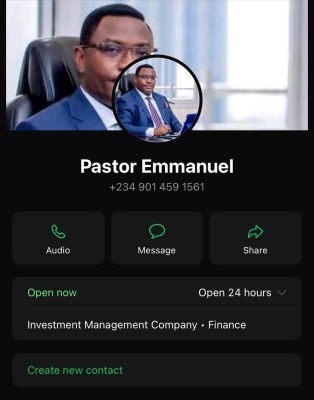
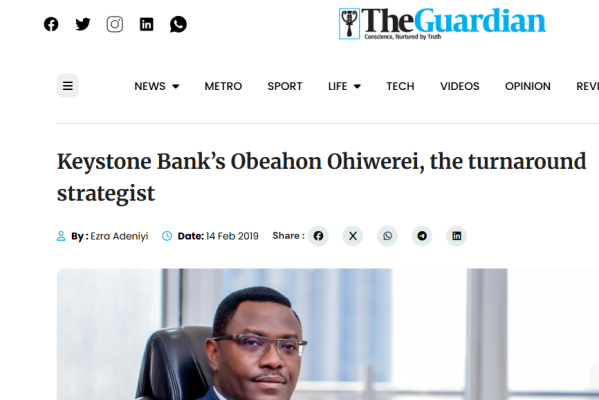
Investigations also revealed that the phone numbers attached used by the admins were not linked to any registered National Identification Numbers (NIN).
The admin of the fourth scam group, Adesola Kazeem, presented as former Chief Executive Officer (CEO) of First Bank, Adesola Adeduntan.
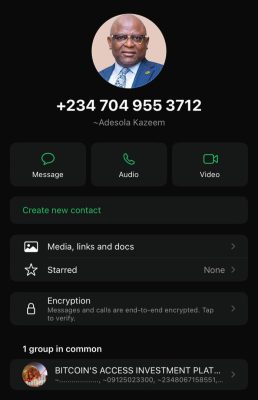

Scammers use emotional manipulation, trust to lure victims – psychologist
Many experts have linked the rise and popularity of scams and Ponzi schemes to greed and the country’s failing economy.
A senior lecturer of psychology at the University of Ilorin, Dr. Adegesin Bamikole Emmanuel, however, noted that these scammers exploit the workings of the human mind and exploit human psychological tendencies.
“They use emotional manipulation to defraud people. When we talk of emotional manipulation, we are talking about the manipulation of the feelings of the victims. They use what we call emotional appeal. For instance, talking about high returns and the urgency of the issue.
“They create a sense of excitement that we call fear of missing out. They promise victims that it is very urgent and that they have to invest. The prospective victims who do not want to miss out on the returns being envisaged are lured into their nests,” said Adegesin.
Adegesin cited examples of scammers using fake testimonies and fake endorsements from reputable TV and radio stations and celebrities to convince victims.
The Guardian found that three Facebook accounts impersonating TVC had used its page to promote Boldgains in the past.
“They will tell their victims that if this thing is not real, it won’t be aired on TV or posted on social media. Many people would move to engage in the investment and lose their money.”
He added that they also use trust to lure victims into their web. The admins of some scam groups, like Boldgains, claim to be professionals like chartered accountants or experts, or people with authority like religious leaders.
“Many of us trust our religious leaders. Some people may think that if their pastor or imam is engaging in those schemes, they are reliable. So, they use that to build trust.
“Scammers gain trust through building rapport with their victims and use persuasive language.”
According to the psychology lecturer, these are exploited by scammers to lure people who are experiencing financial stress, anxiety, and are emotionally vulnerable.
What does the Nigerian law say?
The Nigerian Cybercrimes (Prohibition, Prevention, etc) Amendment Act, 2024, provides a legal framework for internet-related scams.
The act prohibits the use of the internet and computers for fraudulent purposes. Offenders are to face seven years imprisonment, or N5,000,000 fine, or both.
““(1) Any person who is engaged in the services of any financial institution, and as a result of his special knowledge commits identity theft of its employer, staff, service providers and consultants with the intent to defraud is guilty of an offence and upon conviction shall be sentenced to 7 years imprisonment or N5,000,000.00 fine or both,” the section reads.
With the Investment and Securities Act 2025 now in force, the Securities and Exchange Commission (SEC) can prosecute Ponzi scheme operators, who face up to 10 years imprisonment and N40 million in fines.
Is WhatsApp culpable?
Scam groups and Ponzi schemes thrive on WhatsApp because of its trust-based, peer-to-peer structure and end-to-end encryption feature.
Because of end-to-end encryption, WhatsApp cannot read user messages and only reviews content when it is flagged or reported. While this protects the privacy of users, it also leaves the platform with little oversight of fraudulent groups, a loophole scammers continue to exploit.
While it may be argued that these features make the application an enabler, the platform has provided “report,” “block,” and group reporting tools to protect its users. It also does not condone scams and has worked to ensure the platform is safe for users, despite these features that make it hard for it to detect scams technically.
For instance, it banned over six million accounts that were linked to criminal scam centers in the first half of 2025. The platform also recently added new safety features to help users detect and avoid scams across group and individual chats.
“These scam centers typically run multiple schemes at once, ranging from fake cryptocurrency investments to elaborate pyramid-style operations. One of the major red flags in these scams is the request for upfront payments in exchange for promised returns—an indicator users should always treat with caution,” WhatsApp said in a statement.
Scams may be thriving on WhatsApp, but the lecturer believes they can be curbed through financial literacy, saying Nigerians would be less vulnerable if they understood the tricks behind them.
Tags:
No tags
Related Posts
Loading...



